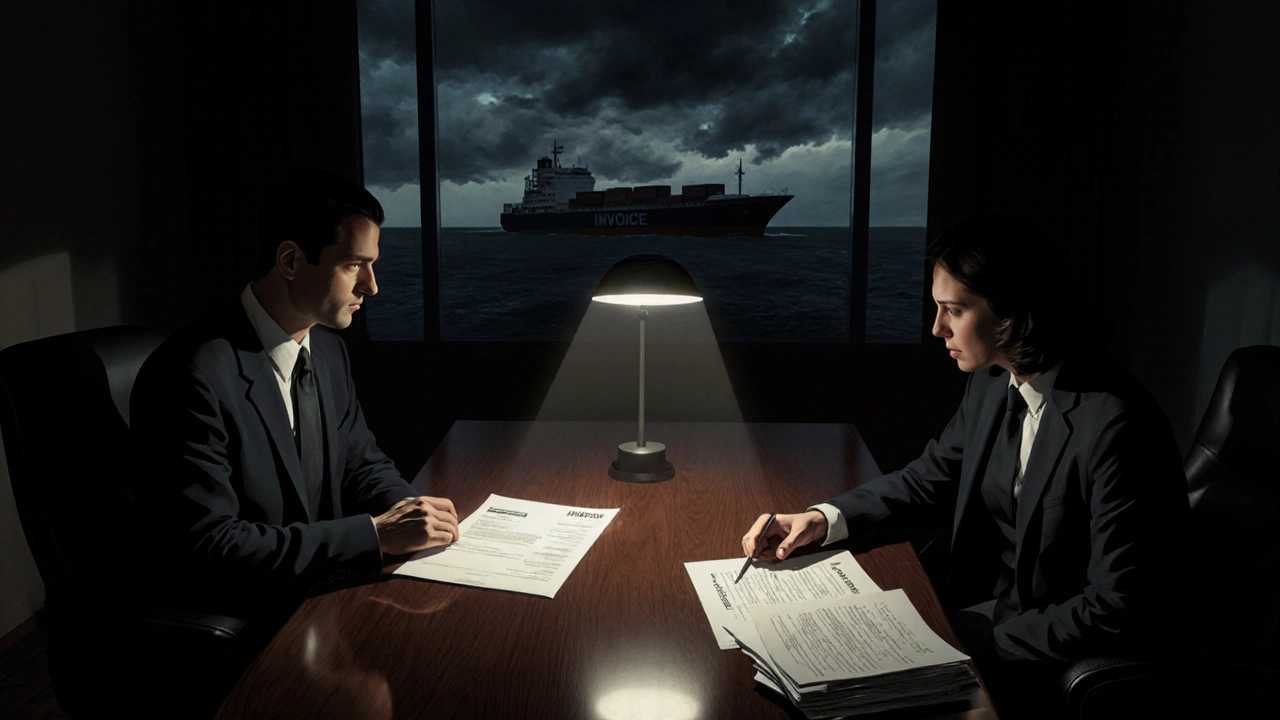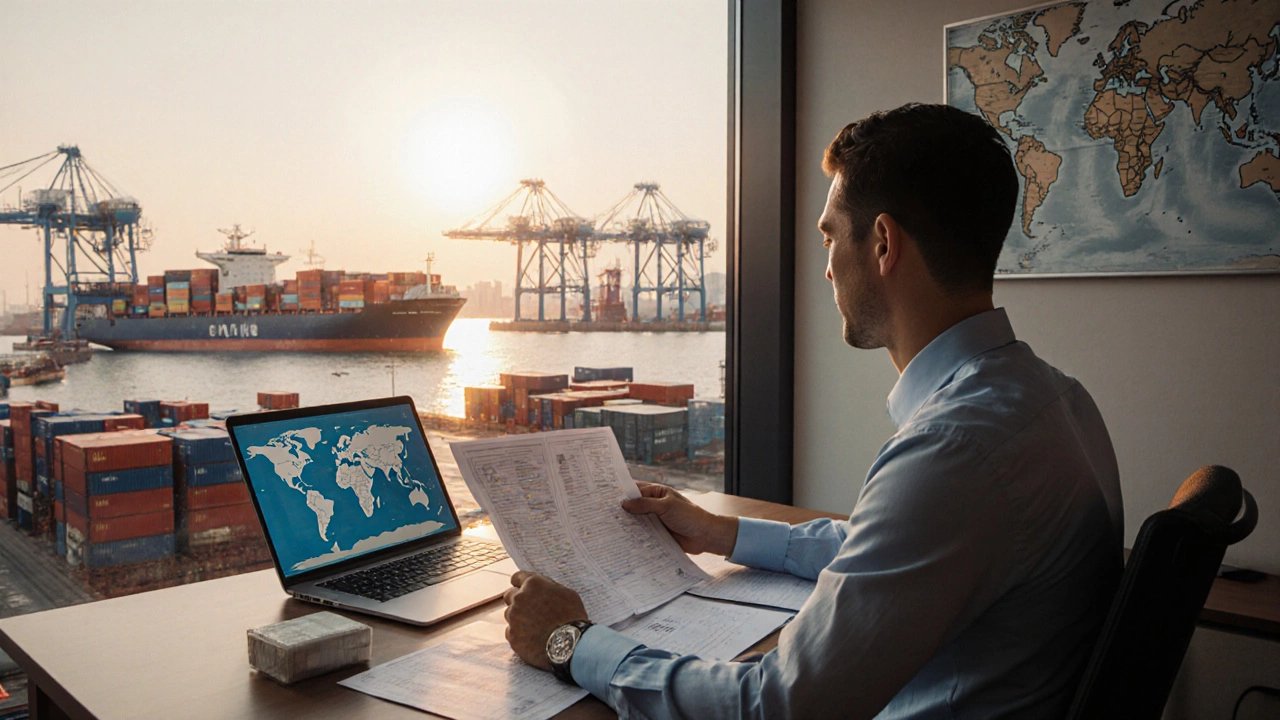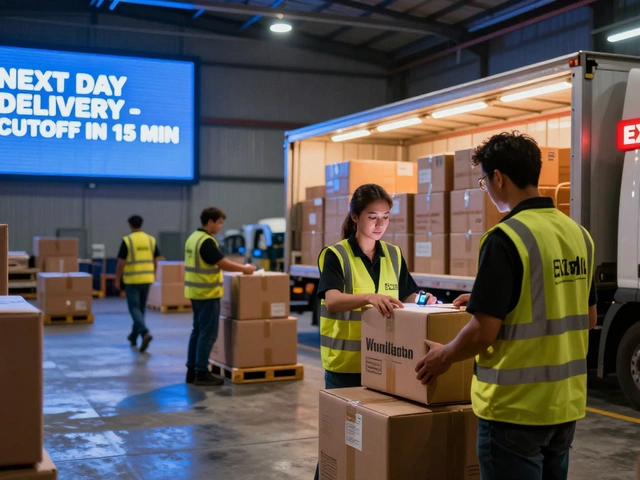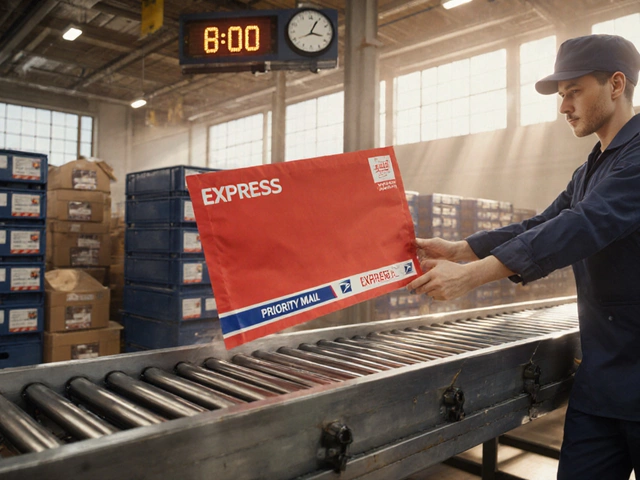Incoterms Payment Responsibility Checker
Who Pays for What?
Select an Incoterm below to see which party (Shipper or Consignee) is responsible for freight, insurance, and customs clearance.
Payment Responsibilities
When you ship goods overseas, the first question that pops up is: freight forwarder pay - who actually foots the bill? The answer isn’t a one‑size‑fits‑all, but understanding the key players and the rules that govern their responsibilities makes the process a lot clearer.
What a Freight Forwarder Actually Does
Freight Forwarder is a logistics specialist who arranges the movement of cargo from the shipper to the final destination. They coordinate carriers, handle documentation, manage customs clearance, and often negotiate freight rates on behalf of their clients. In short, they are the middle‑man who makes international shipping happen without you needing to call every shipping line yourself.
Key Parties Involved in a Shipment
- Shipper is the party that owns the goods and initiates the export process. The shipper contracts the freight forwarder and provides the commercial invoice.
- Consignee receives the shipment in the destination country. The consignee may be the buyer, a warehouse operator, or a third‑party logistics provider (3PL).
- Carrier is the vessel, airline, truck, or rail line that physically transports the cargo. Carriers issue the Bill of Lading and charge freight based on weight, volume, and route.
- Customs Broker handles customs clearance in the importing country. They file import declarations, pay duties, and ensure compliance with import regulations.
Incoterms: The Rulebook for Who Pays What
International Commercial Terms - or Incoterms - are a set of standardized trade terms published by the International Chamber of Commerce. They outline exactly when ownership and risk transfer from shipper to consignee, and they dictate who covers freight, insurance, and customs duties.
| Incoterm | Who pays freight? | Who pays insurance? | Who handles customs? |
|---|---|---|---|
| EXW (Ex Works) | Consignee | Consignee | Consignee |
| FCA (Free Carrier) | Consignee (after carrier pickup) | Consignee (optional) | Consignee |
| FOB (Free On Board) | Consignee (once cargo is on board) | Consignee (optional) | Consignee |
| CIF (Cost, Insurance & Freight) | Shipper (includes freight) | Shipper (mandatory) | Consignee |
| DDP (Delivered Duty Paid) | Shipper (covers everything) | Shipper | Shipper |
Notice the pattern? The more responsibility you assign to the seller, the less the buyer has to worry about. But each term also shifts risk - if you opt for DDP, you’re betting that the freight forwarder can handle every detail smoothly.

How Freight Forwarders Get Paid
Freight forwarders charge in a few different ways, and the payment source usually follows the Incoterm you’ve agreed on.
- Freight Charges: This is the cost of moving the cargo. Under FOB or CIF, the shipper pays the forwarder up front. Under EXW or FCA, the consignee pays after the forwarder hands over the cargo to the carrier.
- Service Fees: Forwarders add a handling or documentation fee. Some forwarders bill the shipper, some bill the consignee, and a few split the fee based on contract negotiations.
- Customs Brokerage Fees: If the forwarder also acts as a customs broker, they might bundle the brokerage fee into the freight invoice. Again, who pays depends on the Incoterm - DDP puts that on the shipper, while EXW leaves it to the consignee.
- Insurance Premiums: When you select CIF, the forwarder arranges cargo insurance and the shipper pays the premium. If you opt for FOB, you might purchase insurance yourself, so the forwarder isn’t involved in that cost.
In practice, most forwarders issue a single invoice that lists freight, fees, and any optional services. The invoice is sent to the party named in the contract, which is often the shipper for export‑oriented trades and the consignee for import‑oriented trades.
Common Scenarios and Who Ends Up Paying
Scenario 1: Small‑scale e‑commerce seller exporting from Auckland
Jane runs an online store and ships handmade jewelry to the United States. She selects DDP because she wants a hassle‑free experience for her customers. Jane contracts a local freight forwarder who arranges pickup, ocean freight, insurance, customs clearance, and final delivery. In the invoice Jane receives, the freight forwarder’s fees cover everything - freight, insurance, customs duties, and even the last‑mile delivery. Jane’s customers pay nothing extra.
Scenario 2: Large manufacturer using FOB
Auckland‑based furniture manufacturer ships bulk orders to a retailer in Germany. The contract specifies FOB. The manufacturer hires a freight forwarder to get the containers to the port and load them onto the vessel. The forwarder invoices the manufacturer for freight to the port. Once the cargo is on board, the German buyer’s own freight forwarder takes over and pays the ocean freight from the departure port onward. In this split‑payment model, both parties see separate invoices.
Scenario 3: Importer using EXW
An importer based in Sydney orders raw materials from a supplier in Auckland. The supplier quotes EXW, meaning the goods are ready for pickup at the supplier’s warehouse. The Sydney importer hires a freight forwarder to collect the cargo, arrange transport, and handle customs. The forwarder’s invoice goes straight to the importer - the supplier never sees a freight invoice.
Tips to Avoid Payment Surprises
- Write the Incoterm into the purchase order and double‑check it before signing.
- Ask the freight forwarder for a detailed cost breakdown before they book any service.
- Confirm who the invoice will be addressed to - shipper, consignee, or both.
- Consider a freight forwarder that offers integrated customs brokerage to reduce the number of invoices.
- Keep a copy of the Bill of Lading; it shows who the carrier billed and can help resolve disputes.

When Things Go Wrong: Dispute Resolution
If you receive an invoice you didn’t expect, start by checking the Incoterm clause in your contract. Most disputes arise from a misunderstanding of who is responsible for freight versus customs duties. Communicate with both the forwarder and the carrier quickly. In many cases, the forwarder will issue a credit or adjust the invoice if the mistake is clear.
For more serious disagreements, you can involve a trade mediator or refer to the ICC’s dispute‑resolution guidelines. Keeping all documentation - commercial invoice, purchase order, Incoterm agreement, and freight forwarder quote - makes your case stronger.
Bottom Line
Who pays a freight forwarder? The short answer: whoever the Incoterm designates. The longer answer: understand each party’s role, read the contract carefully, and request a transparent invoice. By doing so, you keep your supply chain moving without unexpected costs.
Frequently Asked Questions
Can the shipper and consignee split freight forwarder fees?
Yes. Many contracts allow a 50/50 split or another negotiated ratio. It must be documented in the purchase order or service agreement.
What happens if I choose the wrong Incoterm?
You may end up paying unexpected duties or freight charges. The key is to audit the invoice against the agreed Incoterm and request a correction if needed.
Do freight forwarders always handle customs clearance?
Not always. Some forwarders partner with a customs broker, while others offer full‑service clearance. Verify the service scope before you sign.
Is insurance mandatory for all shipments?
Only when the Incoterm requires it, like CIF. Otherwise, it’s optional, and you can arrange your own coverage.
How can I verify the legitimacy of a freight forwarder?
Check for membership in reputable bodies such as FIATA, NVOCC licensing, and read client reviews. A transparent quote and clear terms are good signs.





